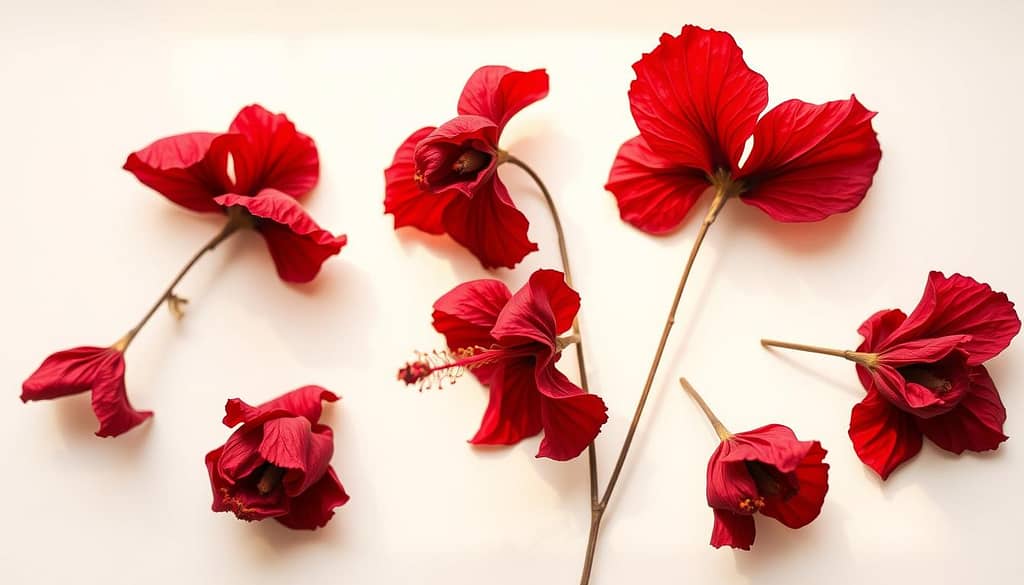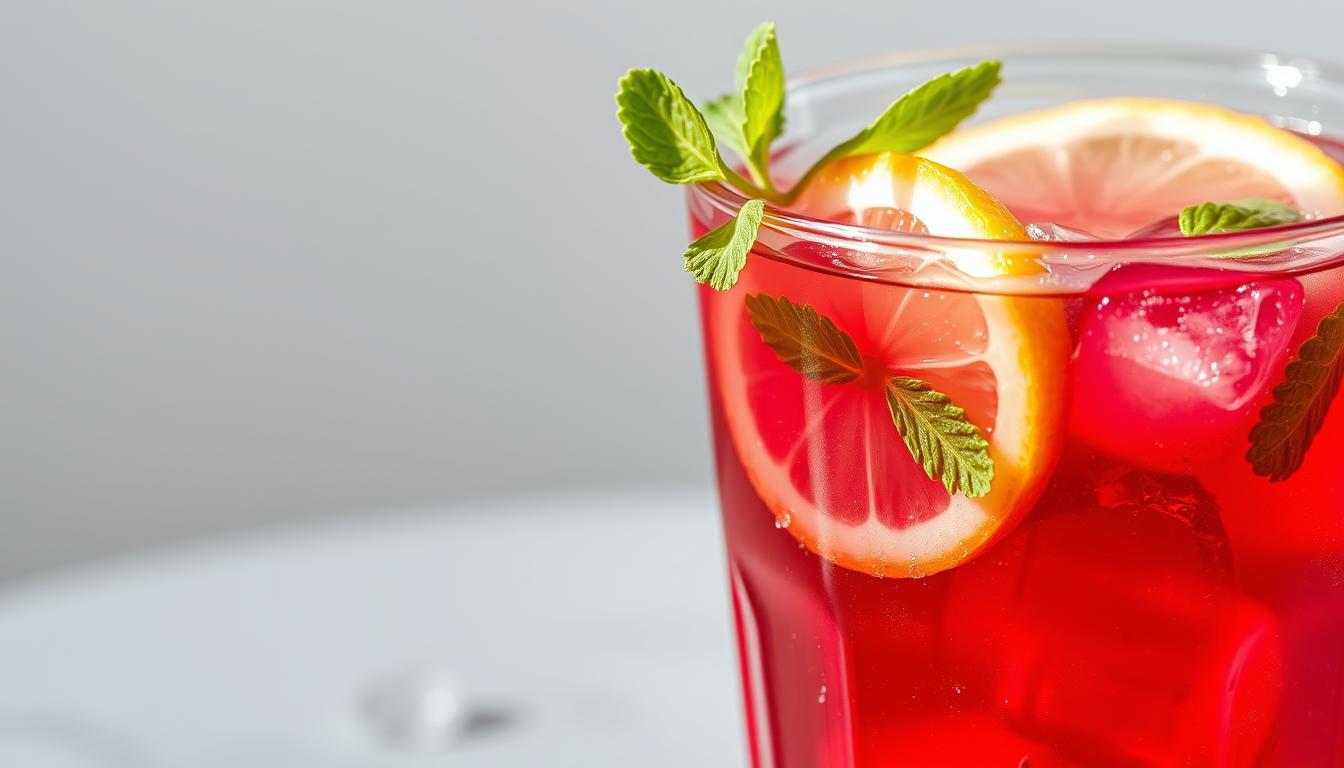Bright, tart, and naturally caffeine-free, this ruby-red drink has been enjoyed for centuries across cultures. Made from dried hibiscus flowers, it offers a cranberry-like zing that quenches thirst while packing a nutritional punch.
Known as karkade in Egypt and agua de Jamaica in Mexico, this versatile beverage can be served hot or cold. Its two-ingredient base—flowers and water—makes preparation simple, while allowing room for creative twists like sparkling versions or spiced infusions.
Beyond its refreshing taste, studies highlight its antioxidant properties and potential heart health benefits. Whether you need a summer cooler or a year-round wellness boost, this vibrant drink delivers flavor and function in every sip.
Key Takeaways
- Naturally caffeine-free with a tangy cranberry-like flavor
- Originates from multiple cultures under different names
- Simple to prepare with just two base ingredients
- Offers antioxidants and potential heart health benefits
- Versatile for hot or cold serving styles
What Is Iced Hibiscus Tea?
Unlike true teas from the Camellia sinensis plant, this ruby drink is an herbal infusion made from dried hibiscus flowers. The edible variety, Hibiscus sabdariffa, grows in warm climates and forms the base of tart, crimson brews worldwide.

Its flavor resembles cranberry juice but with a lighter, less syrupy finish. The deep red hue comes from natural pigments in the calyxes—the part of the flower used for brewing. Be cautious; these pigments can stain surfaces easily.
Globally, it goes by many names and forms:
| Region | Name | Unique Twist |
|---|---|---|
| Egypt | Karkade | Served hot or cold with sugar |
| Mexico | Agua de Jamaica | Often mixed with lime juice |
| Caribbean | Sorrel | Spiced with ginger or cloves |
Since it’s caffeine-free, you can enjoy it any time of day. Just remember: ornamental garden varieties aren’t edible—always use food-grade hibiscus flowers.
Health Benefits of Iced Hibiscus Tea
Beyond its refreshing taste, this ruby-red infusion offers science-backed wellness perks. Studies highlight its potential to combat oxidative stress, support cardiovascular health, and even aid detoxification.
Rich in Antioxidants
The deep color comes from anthocyanins—pigments that neutralize harmful free radicals. A single cup delivers 15–30% of your daily vitamin C needs, boosting immunity.
“Hibiscus ranks among the top antioxidant-rich beverages, comparable to green tea and blueberries.”
Other key compounds include flavonoids and polyphenols, which may reduce inflammation linked to chronic diseases.
Supports Heart Health
Clinical trials show it helps regulate blood pressure. A NIH meta-analysis found systolic reductions averaging 7–13 mmHg with regular consumption.
| Health Marker | Improvement | Study Source |
|---|---|---|
| LDL cholesterol | ↓ 8–12% | Journal of Nutrition |
| Blood pressure | ↓ 10% (systolic) | NIH Trial |
Mineral content like potassium and magnesium further aids circulation. However, those on hypertension medications should consult a doctor—it may enhance drug effects.
Considerations and Limits
While generally safe, avoid excessive intake (2–3 cups/day max). Pregnant women should skip it due to estrogen-like effects. Its mild diuretic properties make it great for detox but may interact with certain medications.
Compared to soda, it’s a zero-fat, low-calorie alternative that fights inflammation instead of fueling it. For optimal health benefits, brew it fresh and skip excess sweeteners.
Ingredients You’ll Need
The foundation of this ruby-red beverage lies in quality dried flowers and sweeteners. With just a handful of ingredients, you can create a drink that’s both refreshing and customizable to your taste.
Choosing the Right Flowers
Always opt for dried hibiscus flowers labeled as food-grade. Ornamental varieties may contain pesticides. You’ll find them online or in international grocery stores, often sold as “flor de Jamaica” or “karkade.”
For fresh petals, remove the calyx and pistil before use. Convert measurements easily:
| Form | Amount per 4 Cups Water |
|---|---|
| Dried | ¼ cup |
| Fresh | 2 cups (equals ½ cup dried) |
Sweetener Options
Balance the natural tartness with your preferred sweetener. Each adds a unique flavor profile:
| Type | Flavor Notes | Best For |
|---|---|---|
| Honey | Floral, mild | Cold brews |
| Agave | Neutral, smooth | Vegan diets |
| Maple syrup | Earthy, rich | Warm infusions |
For sugar-free versions, try stevia or monk fruit. Skip artificial sweeteners—they can leave a metallic aftertaste. Unsweetened? Expect a bold, cranberry-like zing.
How to Make Iced Hibiscus Tea
Unlock the full flavor of floral tartness with these foolproof brewing techniques. Whether you crave a quick recipe or a slow infusion, both methods deliver a vibrant, tangy sip.
Step 1: Steep the Flowers
Hot Brew Method:
- Heat water to 200°F (just below boiling).
- Add ¼ cup dried flowers per 4 cups water.
- Steep 15–20 minutes for bold flavor—less for milder taste.
Cold Brew Method:
- Combine flowers and cold water in a pitcher (same ratios).
- Refrigerate 20 minutes to overnight. Longer steeps deepen the color.
Tip: Oversteeping causes bitterness. Taste-test at intervals.
Step 2: Strain and Sweeten
Pour the brew through a fine-mesh sieve or cheesecloth to strain sediment. Add sweeteners like honey or agave after straining—they dissolve better in warm liquid.
For sparkling versions, mix with soda water. Chill for 1 hour before serving over ice. The color shifts from bright red to deep burgundy as it cools.
Quick Fixes:
- Too tart? Add a splash of citrus juice.
- Weak flavor? Use more flowers next time.
Creative Variations to Try
Transform your basic brew into a showstopper with these easy twists. A few extra ingredients can turn the tart infusion into a signature drink for any occasion.
Sparkling Hibiscus Tea
Add effervescence by mixing equal parts chilled brew and sparkling water. Serve in a tall glass with:
- Lime juice wedges for tangy brightness
- Frozen berries as edible ice cubes
- A tajín rim (chili-lime salt) for Mexican flair
“Carbonation lifts floral notes while softening tartness—ideal for those new to hibiscus flavors.”
Spiced Hibiscus Tea
Warm spices add depth to the ruby infusion. Simmer with these combos:
| Spice Blend | Steeping Time | Perfect Pairing |
|---|---|---|
| Cinnamon + orange peel | 10 minutes | Vanilla syrup |
| Ginger + star anise | 8 minutes | Honey drizzle |
Herb lovers can add fresh mint or basil after straining. For adults, spike with 1 oz tequila or rum per serving.
Pro tips:
- Freeze into popsicles with diced fruit
- Layer with mango puree for a sunset effect
- Blend with ice for a slushy texture
Serving Suggestions
Elevate your refreshment game with creative presentation ideas that make every sip special. The right garnishes, glassware, and pairings transform this vibrant drink into a centerpiece for any occasion.
Garnishes and Glassware
Choose a glass that matches the mood. Mason jars add rustic charm, while highball glasses keep it sleek. For a festive touch, rim the edge with sugar or tajín spice blend.
Enhance flavor and visuals with:
- Fresh mint sprigs or edible flowers
- Lime wedges for a citrusy zing
- Frozen berries as colorful ice cubes
Perfect Pairings
Balance tartness with savory or sweet bites. Try:
| Category | Pairing Idea | Why It Works |
|---|---|---|
| Savory | Halloumi cheese or spiced nuts | Salty contrast cuts acidity |
| Sweet | Lemon tarts or baklava | Citrus notes harmonize |
For gatherings, serve with a Mediterranean mezze bowl featuring olives, hummus, and low-fat dips. Kids love it with fun paper straws and a splash of apple juice to mellow the tartness.
“Edible garnishes double as flavor boosters—think rosemary skewers or candied ginger.”
Keep it chilled with insulated pitchers or ice molds made from the brew itself. For brunch, pair it with shakshuka or avocado toast for a colorful spread.
Storage Tips
Keep your floral brew fresh longer with these smart storage solutions. Whether you use a glass pitcher or freeze for later, proper methods lock in flavor and color.
- Use airtight glass containers—metal causes oxidation
- Lasts up to 1 week in the fridge
- Prevent separation by stirring before serving
For freezer storage, pour cooled concentrate into ice cube trays. These flavor bombs melt perfectly into water or sparkling drinks. Frozen batches keep for 2 months.
Pro Tips:
- Label containers with dates to track freshness
- Store away from strong-smelling foods to avoid odor absorption
- Batch only what you’ll use in a week—flavor fades over time
Note: The vibrant hue may lighten slightly in storage. This doesn’t affect taste or fat-free benefits. Keep away from sunlight to preserve antioxidants.
Conclusion
With just flowers and water, you unlock a world of flavor and vitality. This hibiscus tea blends simplicity with health benefits, from antioxidants to blood pressure support.
Don’t stop at the basic recipe. Try sparkling versions or spice infusions for a personalized twist. Share your creations online—tag #RubyRefresh for inspiration.
Remember: Avoid excess if pregnant or on medications. Swap soda for this vibrant sip year-round. Summer or winter, it’s a guilt-free upgrade.

